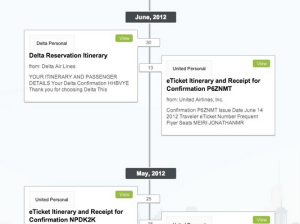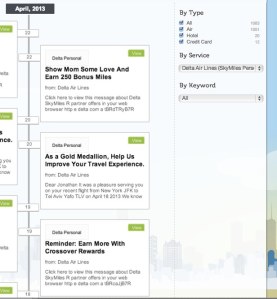Superfly launched at TechCrunch Disrupt SF in 2010 with plans to become the Mint.com of travel, or more specifically, for your rewards and frequent flier miles and travel spending. Following Kayak’s lead, over time, the startup added metasearch capabilities, integrating rewards and points into the flight booking process. Its approach attracted ex-Kayak CFO Bill Smith, who began advising the startup after leaving Kayak before its IPO.
Under his guidance, and backed by seed funding from travel veterans like Smith and Travelport Chairman Jeff Clarke, Superfly is today launching a product that clearly shows the travel startup is headed in a new direction. Whether you call it a pivot or not, Superfly founder Jonathan Meiri tells us that the team eventually became frustrated by the limitations of metasearch and simply trying to “build a better Kayak,” and has instead decided to move in a new direction, focusing on the areas where it can actually provide more value.
“The reality was that we’ve been fairly successful at acquiring customers at a significantly lower cost than traditional travel players, and, over time, our customers had entrusted us with a boatload of their travel data,” Meiri tells us. They quickly realized that this “share-of-wallet” data was its most valuable data, so, over the last nine months, Superfly has shifted its focus exclusively to that data.
During that time, Superfly developed Superbox, which, like LinkedIn, looks at a user’s email contacts to suggest new connections, and like TripIt organizes your itineraries, the service allows users to view and organizes their travel history.
 Thousands of users are now our using Superbox to find lost miles buried in their email, the founder says. Beyond finding those lost accounts and emails, the startup’s patent-pending tech extracts data from key data points within emails, like receipts, itineraries, offers and boarding passes, for example, to build a deeper personal travel wallet.
Thousands of users are now our using Superbox to find lost miles buried in their email, the founder says. Beyond finding those lost accounts and emails, the startup’s patent-pending tech extracts data from key data points within emails, like receipts, itineraries, offers and boarding passes, for example, to build a deeper personal travel wallet.
Today, Superfly is adding an important piece on top of Superbox in an effort to expose these emails to users to help them better manage their travel. The product, called Travel Emails, is also part of the startup’s move to collect more nuanced data on your travel behaviors so that it can target flights, awards and promotions more effectively.
Essentially, the new tool collects users’ travel emails in a searchable timeline-type interface, which makes this data easier to parse. In a way, it’s not unlike the capabilities offered by TripIt, while focusing more on aggregating user travel data in a single interface, giving your travel info its own dedicated hub, rather than having it be drowned out in the noise of your inbox.
Superfly has been keen to streamline travelers’ ability to find promotions for their trips, along with loyalty updates for frequent fliers, reservations and so on. However, it’s been tough for the startup to offer any kind of real personalization from the limited publicly available travel profile data out there.
 Getting access to this data is important, Meiri says, because it helps increase the opportunities for value (and revenue) generation. Of course, there’s a lot of responsibility that comes with access to this personal data, so the founder was quick to assure us that Superfly with never sell that data to third-parties, instead allowing travel suppliers to target offers to users based on the more robust travel profiles it can create from this data.
Getting access to this data is important, Meiri says, because it helps increase the opportunities for value (and revenue) generation. Of course, there’s a lot of responsibility that comes with access to this personal data, so the founder was quick to assure us that Superfly with never sell that data to third-parties, instead allowing travel suppliers to target offers to users based on the more robust travel profiles it can create from this data.
“Beyond creating value for consumers, travel suppliers can now leverage the aggregated traveler data to provide valuable offers and promotions to the highest value travelers,” the former Kayak CFO says, “and consumers can now receive these offers simply by joining Superfly.”
The last 10 years in travel have been dominated by the rise of meta search and OTAs. These companies have generated a tremendous amount of the value for shareholders by creating mass market tools, arbitraging web traffic and making affiliate revenue. While this game will continue to work for a while, Meiri says, the next ten years are going to be all about personalization. And personalization, of course, is all about consumer data.
For more, find Superfly at home here.
